Invitrogen
CD184 (CXCR4) Monoclonal Antibody (2B11), PerCP-eFluor™ 710, eBioscience™
FIGURE: 1 / 14
CD184 (CXCR4) Antibody (46-9991-82) in Flow
-Flow-20170216130641.jpg?time=20220826)
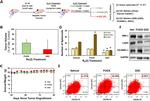
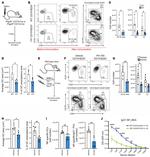

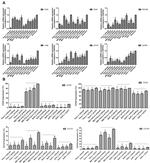
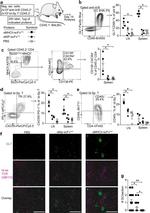
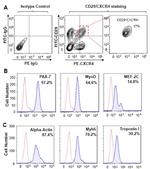
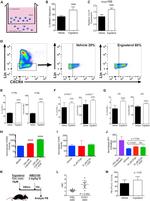
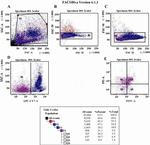
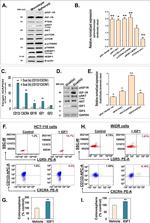
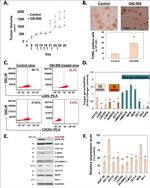
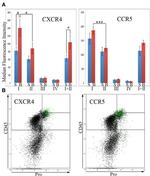


Product Details
46-9991-82
Species Reactivity
Published species
Host/Isotype
Recommended Isotype Control
Class
Type
Clone
Conjugate
Excitation/Emission Max
Form
Concentration
Purification
Storage buffer
Contains
Storage conditions
Shipping conditions
RRID
Product Specific Information
Description: The 2B11 monoclonal antibody reacts with mouse and human CXCR4, also known as CD184, Fusin, LESTR, or HUMSTR. Fusin is a member of the G-protein-coupled chemokine receptor family with seven membrane-spanning domains, and functions as a coreceptor for X4 HIV-1 entry into CD4+ cells. In addition it has been shown to play a role in lymphocyte migration. The ligand for CXCR4 is SDF1. CXCR4 is required for maintenance of granulocyte progenitors in the bone marrow and essential for B cell development. Expression of CXCR4 is different between mice and human. In the thymus CXCR4 is restricted to CD4+CD8+ cells while in the spleen predominant expression is found on B lymphocytes.
The monoclonal antibody 2B11 recognizes the amino terminus of CXCR4 and has been reported to have functional activity; it does not block SDF1a but causes internalization of the receptor.
Applications Reported: This 2B11 antibody has been reported for use in flow cytometric analysis.
Applications Tested: This 2B11 antibody has been tested by flow cytometric analysis of mouse thymocytes. This can be used at less than or equal to 1 µg per test. A test is defined as the amount (µg) of antibody that will stain a cell sample in a final volume of 100 µL. Cell number should be determined empirically but can range from 10^5 to 10^8 cells/test. It is recommended that the antibody be carefully titrated for optimal performance in the assay of interest.
PerCP-eFluor® 710 can be used in place of PE-Cy5, PE-Cy5.5 or PerCP-Cy5.5. PerCP-eFluor® 710 emits at 710 nm and is excited with the blue laser (488 nm). Please make sure that your instrument is capable of detecting this fluorochrome. For a filter configuration, we recommend using the 685 LP dichroic mirror and 710/40 band pass filter, however the 695/40 band pass filter is an acceptable alternative.
Our testing indicates that PerCP-eFluor® 710 conjugated antibodies are stable when stained samples are exposed to freshly prepared 2% formaldehyde overnight at 4°C, but please evaluate for alternative fixation protocols.
Excitation: 488 nm; Emission: 710 nm; Laser: Blue Laser.
Filtration: 0.2 µm post-manufacturing filtered.
Target Information
CXCR4 (Fusin, LESTR, HUMSTR) is a member of the G-protein-coupled chemokine receptor family with seven membrane-spanning domains, and functions as a co-receptor for X4 HIV-1 entry into CD4+ cells. CXCR4 has been proved to be the co-receptor for HIV-2's binding to CD4 through envelope glycoprotein gp 120 and promotes Env-mediated fusion of the virus. In other cases, CXCR4 can even function as the only receptor for HIV-2's binding to the CD4 host cells. CXCR4 is the receptor for the C-X-C chemokine CXCL12/SDF-1 that transduces a signal by increasing intracellular calcium ion levels and enhancing MAPK1/MAPK3 activation. CXCR4 acts as a receptor for extracellular ubiquitin; leading to enhanced intracellular calcium ions and reduced cellular cAMP levels. Also, CXCR4 is involved in hematopoiesis and in cardiac ventricular septum formation, and plays an essential role in vascularization of the gastrointestinal tract, probably by regulating vascular branching and/or remodeling processes in endothelial cells. In the CNS, CXCR4 could mediate hippocampal-neuron survival and is involved in cerebellar development. CXCR4 binds bacterial lipopolysaccharide (LPS) and mediates LPS-induced inflammatory response, including TNF secretion by monocytes. Antibodies to CXCR4 block HIV-1 and HIV-2 fusion and infection of human target cells. The amino-terminal domain and the second extracellular loop of CXCR4 serve as HIV biding sites.
For Research Use Only. Not for use in diagnostic procedures. Not for resale without express authorization.
How to use the Panel Builder
Watch the video to learn how to use the Invitrogen Flow Cytometry Panel Builder to build your next flow cytometry panel in 5 easy steps.
Bioinformatics
Protein Aliases: C Cmotif chemokine; C X C motif chemokine; C-X-C chemokine receptor type 4; CC motif chemokine; CCmotif chemokine; CD antigen CD184; CD184; chemokine (C-X-C) receptor 4; chemokine receptor 4; CXC; CXC motif chemokine; CXC-R4; CXCR-4; Fusin; HUMSTR; LESTR; Leukocyte-derived seven transmembrane domain receptor; leukocyte-expressed seven-transmembrane-domain; PB-CKR; Pre-B-cell-derived chemokine receptor; SDF-1 receptor; Stromal cell-derived factor 1 receptor
Gene Aliases: b2b220Clo; CD184; Cmkar4; Cxcr4; LESTR; PB-CKR; PBSF/SDF-1; Sdf1r
UniProt ID: (Mouse) P70658
Entrez Gene ID: (Mouse) 12767

Performance Guarantee
If an Invitrogen™ antibody doesn't perform as described on our website or datasheet,we'll replace the product at no cost to you, or provide you with a credit for a future purchase.*
Learn more
We're here to help
Get expert recommendations for common problems or connect directly with an on staff expert for technical assistance related to applications, equipment and general product use.
Contact tech support
-Flow-20170216130641.jpg?time=20220826)
